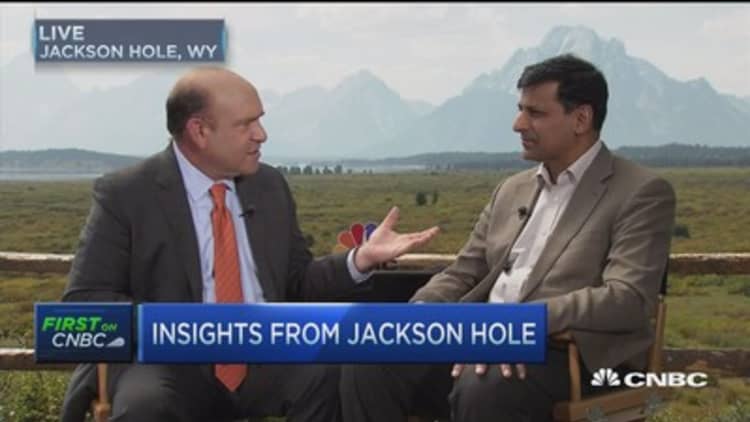
India's central bank doesn't have the same problems the Fed has. It's not worried about deflation, India is growing twice as fast as the U.S., and interest rates sit around 7 percent.
But that doesn't mean its central bank Gov. Raghuram Rajan is indifferent to when the Fed chooses to raise rates.
"My position over time has been don't do it when the world is in turmoil," he told CNBC's "Closing Bell" Friday. "It's a long anticipated event, it has to happen sometime—everybody knows it has to happen—but pick your time."
For now it doesn't appear as though that decision has been made ahead of the Fed's mid-September policy meeting. Earlier on Friday in a CNBC exclusive, Federal Reserve Vice Chairman Stanley Fischer said it was too early to tell whether volatility in the market made it more or less compelling to raise rates in September.
However, Larry Summers and other prominent market watchers have made that very case, claiming a rate hike in a period of increased volatility and collapsing commodity prices would strengthen the dollar and send global markets back into a downward spiral. But the central banker believes drawing the line from a stronger dollar is not so simple.
Read More Don't buy this 'reflexive bounce': Burbank
"[A strong dollar] does cause some fragility, but on the other hand if it's accompanied by very strong U.S. growth it does help other countries who can then export to the United States and pick up their own economies on that basis," Rajan said.
After all, the U.S. might be growing faster than people thought. Second-quarter GDP growth was revised higher on Friday to 3.7 percent from 3.2 percent, potentially boosting the probability of a September rate hike that many heavily discounted after China devalued its currency.
While the move could hinder exports from the U.S. and other countries including India, Rajan noted the overwhelmingly one-way relation of China's trade activity.
"If in fact there is a greater Chinese slowdown than is anticipated, it wont affect us as much as other countries around the world," he said. "Of course, everybody would like stronger Chinese growth, but to some extent we are among the least affected."
Still, Rajan did not rule out cutting rates in India for a fourth time, admitting that the world's central problem is continued slowing economic growth.


